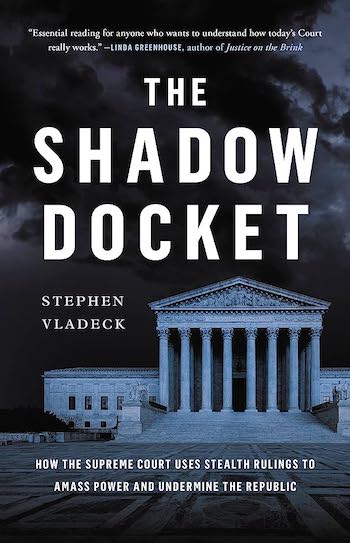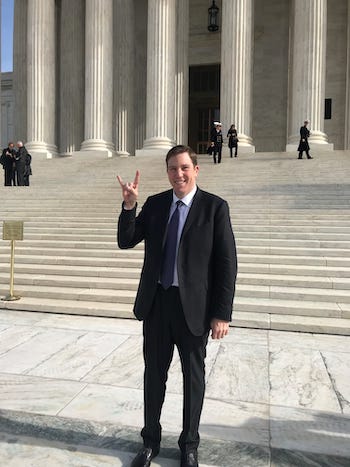Author Interview: Stephen Vladeck on the Troubling Rise of the Shadow Docket at the Supreme Court
By Blake Maddux
A conversation with author Stephen Vladeck who has been called out publicly by Justice Samuel Alito for his criticism of the Supreme Court’s abuse of the shadow docket.

Scholar Stephen Vladeck, the author of The Shadow Docket. Photo: courtesy of the artist
The University of Texas at Austin has been an excellent source of material for me recently.
In recent months, I have interviewed history professor emerita (and current Concord resident) Jacqueline Jones, history and LBJ School of Public Affairs professor Peniel E. Joseph (formerly of Tufts), and – most recently – Stephen Vladeck, the Charles Alan Wright Chair In Federal Courts at Texas Law.
In addition to an 18-year teaching career that includes positions at University of Miami and American University, Vladeck (a 2001 graduate of Amherst College) is the author of countless scholarly articles and opinion pieces, CNN’s Supreme Court analyst, and co-host of two podcasts: The National Law Security Podcast and One First, for which he is joined by his wife, Boston native and fellow attorney Karen Vladeck.
However, the occasion for my recent telephone interview with him was the publication of his New York Times best-selling first book, The Shadow Docket: How the Supreme Court Uses Stealth Rulings to Amass Power and Undermine the Republic (Basic Books).
The shadow docket is, briefly, the portion of the Supreme Court’s work that does not require the hearing of arguments by the justices or the issuing of lengthy and signed opinions, dissents, or concurrences.
“The most significant subset of shadow docket cases,” Vladeck writes, “are rulings on applications for emergency relief, including stays and injunctions pending appeal,”
These decisions often consist of a single sentence, are issued in the dead of night, and go unseen by the public.
However, they have potentially comparable impact to those made on the merits docket, which receive – in Vladeck’s words – “the full nine yards of process” and are widely reported by the media. (Examples include the Court’s recently announced rulings on the constitutionality of affirmative action at colleges and one’s obligation to design websites for gay nuptials.)
“The shadow docket itself has been part of the Court’s work for a long time,” Vladeck explains, “and is output has historically been almost entirely uncontroversial.”
However, its “rise [between 2017 and 2021] has quickly become the dominant symptom of a full-blown institutional crisis.”
What follows are excerpts from the conversation that I had with Vladeck, who, it is worth noting, has been called out publicly by Justice Samuel Alito for his criticism of the shadow docket.
The Arts Fuse: You write that when University of Chicago law professor and former clerk to Chief Justice John Roberts Will Baude coined the term “shadow docket,” he meant it “descriptively, not pejoratively.” What perfectly legitimate and routine function of the Supreme Court was referring to?
Steve Vladeck: A large majority of the thousands of requests to intervene that the Supreme Court gets every year are not controversial. Either the lower courts just unequivocally got the issue right, or it’s a procedural request within one of those appeals that no one’s going to get exercised about.
So the fact that those orders happen in the proverbial shadows — without explanation [by the Court] or attribution [to a justice] — doesn’t and probably shouldn’t bother us. It’s really a small slice of the shadow docket that’s controversial and important.
I think that Will’s point, which I’ve tried to sort of expand upon, is that that slice is increasingly important and increasingly controversial.
AF: Am I wrong to presume, given the book’s subtitle, that you mean it pejoratively?
SV: I actually don’t. I think the term can be an evocative shorthand that gets at the basic distinction between the shadow docket and the merits docket, which is the visibility and accessibility or lack thereof of what happens in these orders. The subtitle is more about how the Court has used and abused it in ways that open it up to criticism.
But I hope that at least the first couple chapters of the book tell a pretty persuasive story of how it’s not necessarily a bad thing that the Court does important stuff in the shadows. It’s just that when it does, there are special concerns that could arise if without explaining itself, the Court seems to be handing down rulings that the best appearance of an explanation has nothing to do with legal principle and everything to do with partisan political preferences.
 AF: What prompted you to begin focusing so intently on the shadow docket?
AF: What prompted you to begin focusing so intently on the shadow docket?
SV: I think what got me paying more attention to the shadow docket as such, and the specific subset of applications for emergency relief within that slice, was when we saw a real flurry of those during the Trump administration. Starting with travel ban 2.0 in the summer of 2017, we saw the Trump administration go to the justices for emergency interventions far more often than we had ever seen before, and in contexts where the impacts were far broader than had really been the norm.
AF: Why has the term, as you write, “taken on a far more insidious connotation”?
SV: I think that the Court there bears some responsibility for that. The way the Court behaved in 2017, 2018, and 2019 — as folks slowly started paying more attention to what was happening through these emergency orders — caused the term to sort of be used as symbolic of those orders. Because the pattern of decision in those years was so consistent with the critique, the two became synonymous.
I think that it might have been a different story if it wasn’t coming into public view alongside criticisms of how the Court was using the shadow docket.
AF: Could you elaborate on “the way the Court behaved”?
SV: The Bush and Obama administrations across 16 years went to the Supreme Court for emergency relief a total of eight times. So once every other year. Trump goes to Court 41 times in four years. That’s a pretty big uptick. The Court didn’t have to acquiesce. The Court let him and voted for him, and I think that was a real sea change.
So the volume of cases and number of times Trump went to the Court really helped to make visible what the Court was doing in ways that if it were one ruling every eight to ten months it would be harder to see.
AF: What is the significance of SCOTUS’s behavior during Trump’s term versus Biden’s time in office thus far?
SV: If you look at how often the Supreme Court froze lower court rulings against Trump immigration policies and how unwilling it’s been to freeze similar lower court rulings against Biden administration immigration policies without any explanation that justifies why one set of cases came out one way and one set came out the other, that’s where you get the appearance — maybe not the reality – that the real explanation for this behavior for this decision making is the policy preferences of justices and not their adherence to the broader principles.
AF: What do you make of the fact that both Justice Kagan and Chief Justice Roberts have criticized the use of the shadow docket?
SV: I think Justice Kagan has been the leading critic [Washington Post piece by Vladeck] on the Court of what the majority of justices have done in this context. She’s written, I think, four separate dissenting opinions that specifically accuse the conservative justices of abusing this authority. I think she has made a real dent with some of those charges.

Stephen Vladeck, outside the Supreme Court on January 16, 2018, after arguing Dalmazzi v. United States. Photo: courtesy of the artist
But it’s one thing for a visible progressive such as Justice Kagan to be criticizing these practices. But when John Roberts is dissenting in these cases, and when he’s saying that he’s dissenting because — even though he’s sympathetic with the other five conservative justices on the merits — he doesn’t think this is the right way to do it.
I think that gives a lot of, frankly, credibility, to the critique that this is not just progressives who are unhappy with the bottom line that the Court is reaching, but rather that there’s real meat to the charge that this is institutional and problematic behavior unrelated to the bottom lines of these rulings.
However persuasive that is coming from someone like Justice Kagan or someone like me, I think it’s quite powerful when it’s coming from John Roberts, who I think no one would confuse with a progressive.
AF: So how do respond to the charge that this book is a cynical or opportunistic attack on a Supreme Court that has six Republican president-appointed justices, three of whom are Trump’s?
SV: That critique leads into the easily disproven charge that people like me are just upset about the results. The book provides a number of examples of cases where I think the conservative Court reached the wrong result but did it the right way. And it has examples of when it reached the right result but the wrong way. The story here is that the process actually matters. The more we ignore the process, the more we fall in to the trap of all that matters is who wins and who loses, and not how the Court is behaving.
AF: Has the book received criticism from anyone with whom you are ideologically like-minded?
SV: I think there are progressives who think that I’m rearranging deck chairs on the Titanic, and who think there are far bigger problems with the Court. There are also progressives who think that the best way forward for those who have our political views and policy preferences is for the Court to lose authority and legitimacy, so pushing to make things better, as I am, is actually inconsistent with that.
Blake Maddux is a freelance journalist who regularly contributes to the Arts Fuse, Somerville Times, and Beverly Citizen. He has also written for DigBoston, the ARTery, Lynn Happens, the Providence Journal, The Onion’s A.V. Club, and the Columbus Dispatch. A native Ohioan, he moved to Boston in 2002 and currently lives with his wife and five-year-old twins — Elliot Samuel and Xander Jackson — in Salem, MA.
Tagged: Basic Books, Shadow Docket, Stephen Vladeck, Supreme Court

